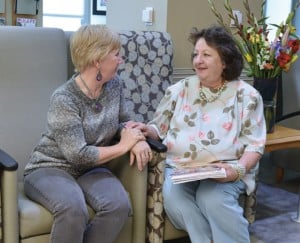Regional One Health has joined the National Association of State Head Injury Administrators’ effort to promote Brain Injury Awareness Month throughout March.
Regional One Health is participating in Uniting for Brain Injury, an annual March awareness campaign to educate the public about brain injury and resulting symptoms that may affect an individual’s ability to return to home, community, school or work without adequate rehabilitative, community and family support.

“Brain injury is a major public health problem in the United States,” said Carolyn Chambers (right), Traumatic Brain Injury service coordinator.
“Brain injury is a major public health problem in the United States, a fact not well understood by the general public or even by some health care professionals,” said Carolyn Chambers, Traumatic Brain Injury Service coordinator. “Individuals who sustain TBIs require timely access to expert care and specialized rehabilitation, but many are not properly diagnosed or connected with services.”
Regional One Health’s Traumatic Brain Injury program provides services for children and adults with a traumatic brain injury, including providing information, referrals to services and agencies, assistance in applying for services, advocacy, and the development of support groups, new programs and activities.
In 2013, 2.8 million Americans sought treatment for or died from a traumatic brain injury (TBI) as the result of a car crash, fall, sporting or recreational injury, an assault or other contributing factor, according to the Centers for Disease Control and Prevention. A TBI may cause problems with cognition, emotions, language, physical mobility and sensory affecting how a person is able to live, work and be a part of everyday life.
This year’s theme, Uniting for Brain Injury, recognizes that it takes federal and state policymakers, organizations, agencies, families and individuals with brain injury working together to advance rehabilitation and treatment and coordinating resources to enable individuals to return to living as independently as possible.
A TBI isn’t an event or an outcome; rather, it’s the beginning of a chronic process impacting the person’s ability to successfully function in school, work and in relationships with others, Chambers said.
Regional One Health’s TBI Support Center serves five counties in Tennessee for the purpose of providing service coordination for children and adults with TBI to help them make the transition from hospital to rehabilitation to work or school to life.
Falls are among the majority of TBIs that lead to emergency department visits, hospitalizations or death. The second-leading cause is unintentional blunt trauma. Motor vehicle crashes are the leading cause of hospitalization for people ages 15 to 44. Other causes include assaults, sports-related injuries and war-related injuries. Alcohol also is frequently a contributing factor.
TBI symptoms vary depending on the extent of the injury and the area of the brain that is injured. Symptoms can appear immediately or take as long as several days, weeks or even years to appear. Not all people experiencing a TBI lose consciousness.
Concussions are brain injuries, and while sometimes classified as mild, the effects can be serious. Concussion symptoms include:
- Inability to recall events prior to or after a hit or fall
- Dazed or stunned appearance
- Confusion over or forgetful of an instruction or assignment
- Clumsy movement
- Slow to answer questions
- Loss of consciousness
- Change in mood, behavior or personality
Regional One Health’s Traumatic Brain Injury Services works with individuals of all ages, and referrals to this free service can be made by the brain injury survivor, a family member or caregiver, rehabilitation facility or any other affiliated professional. For more information about the program, visit our Traumatic Brain Injury Services page.